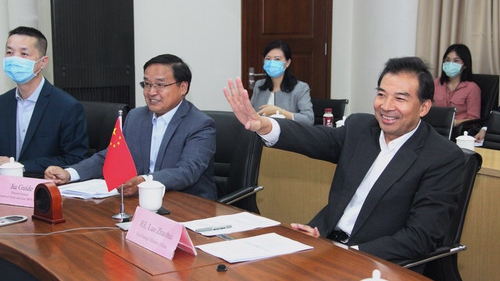Chinese State Councilor and Foreign Minister Wang Yi has hailed the positive outcome of China-ASEAN dialogue and cooperation on maintaining the stability of the South China Sea.
Speaking at the opening of the International Symposium on the South China Sea: From the Perspective of Cooperation, Wang said the two sides have kept maritime dialogue and cooperation despite the COVID-19 pandemic.
China and the Association of Southeast Asian Nations members are committed to the full and effective implementation of the Declaration on the Conduct of Parties in the South China Sea, and the two sides maintained close communication on advancing the negotiation of Code of Conduct during the pandemic, he continued.
Co-hosted by the Chinese Foreign Ministry and the National Institute for South China Sea Studies, the event was attended by former politicians, officials and scholars from various countries in the region and beyond including Russia, Thailand, Indonesia, Singapore, Cambodia, Laos and Britain.
Wang called on regional countries to work together to reject outside inference.
Without naming the United States, Wang said some outside country is interfering in the South China Sea dispute based on its geopolitical interests, sowing relations between countries in the region and disrupting the regional situation.

Chinese Vice Foreign Minister Luo Zhaohui (R) attends a symposium on the South China Sea, September 2, 2020. /Chinese Foreign Ministry
Chinese Vice Foreign Minister Luo Zhaohui (R) attends a symposium on the South China Sea, September 2, 2020. /Chinese Foreign Ministry
China's Vice Foreign Minister Luo Zhaohui, who also made a speech at the event, said interference from the U.S. has been a source of risk in the South China Sea, calling on countries in the region to jointly reject these risks and safeguard peace and stability.
The symposium was held ahead of foreign ministers' meetings on East Asia cooperation next week and amid U.S. attempts to contain China, Luo noted.
"At this background, I'd like to reiterate that China's position and commitments on South China Sea remain unchanged," he said. "We will continue to work with ASEAN countries to make the South China Sea a sea of peace, friendship and cooperation."
Read more:
What's behind tougher U.S. stance on South China Sea?
Expert: U.S. has completely abandoned neutrality on South China Sea

This file photo taken in July 2016 shows a Chinese H-6K bomber patrolling islands and reefs including Huangyan Island in the South China Sea. /Xinhua
This file photo taken in July 2016 shows a Chinese H-6K bomber patrolling islands and reefs including Huangyan Island in the South China Sea. /Xinhua
The diplomat said China and the Association of Southeast Asian Nations (ASEAN) are "close neighbors that could not move." The two sides signed the Declaration on the Conduct of Parties (DOC) in the South China Sea 18 years ago and are speeding up consultations on the Code of Conduct (COC) in the South China Sea despite impacts of the COVID-19 pandemic, he added.
"China believes in settling the disputes of the South China Sea through negotiation and consultation," Luo stressed.
Beijing supports handling the South China Sea issue in accordance with international law including the United Nations Convention on the Law of the Sea (UNCLOS), he said.
Nevertheless, the issue "concerns not just UNCLOS, but also territorial sovereignty," he told the audience. "Its proper solution is only possible when the international law, including UNCLOS, is applied comprehensively and accurately."
Luo reiterated that Beijing does not accept or recognize the so-called South China Sea arbitration in 2016.
"UNCLOS does not regulate issues of territorial sovereignty," he stressed.
"The South China Sea is open and inclusive," he said. "The freedom of navigation has never been an issue in these waters. It is only an excuse created by those who wanted to interfere and make trouble."
Luo criticized the U.S. for making "repeated provocations" and increasing military activities in the South China Sea.
"By interfering in the issue, the U.S. is trying to hijack regional countries. It tries to undermine and divide China and ASEAN countries, forcing them to take sides," he said.
He called on countries in the region to "stay on high alert" against U.S. interference and "focus on cooperation, instead of conflicts."